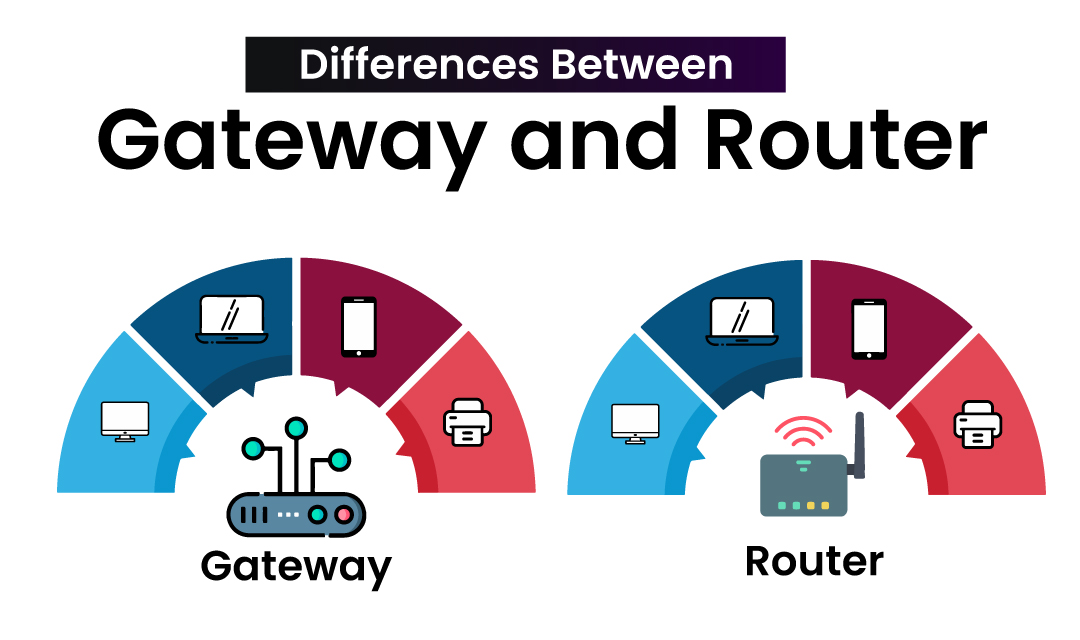
To provide Internet connectivity to homes, ISPs often provide a gateway device to their customers. By connecting a router to the gateway, users create their own local network. A gateway used to be a layer-2 device that extends WAN into an individual's home, but it now provides routing functionality built into the gateway so the term is loosely used.
What is a gateway?
A gateway is a networking device that connects one or more dissimilar networks. The term, "gateway" is used loosely and has different meanings depending on how it is used. A gateway is usually provided by your ISP and provides a connectivity to the Internet.
Gateway is often referred to as modems as traditional dial-up connection required a modem (modulator-demodulator) to convert analog signals into digital signals. Today, there are three types of modems: a cable modem, DSL, and Dial-up. Modems connect two dissimilar networks, and whatever received in one end must be passed to the other end. Modems are layer-2 devices and have no routing capabilities.
As many ISPs provide an integrated modem with a router, and it is often called gateways. AT&T cable, AT&T DSL, Verizon Fios, and many other ISPs bundle a modem with a router and provide it as a "gateway" to end-users, and provide connectivity to the Internet.
What is a router?
A router is a layer-3 networking device that connects one or more similar networks. A router uses its routing table to decide if IP traffic arriving at one end should be passed on to the adjacent network based on the shortest path. To give you an example, we'll use a home router to illustrate the points. The home routers we use today allow a user to create a LAN (Local Area Network), and connects the LAN to the ISP provided WAN (Wide Network Area) connection through the gateway. If your home computer is accessing a NAS drive connected to your router, the traffic does not leave your LAN. If, however, your neighbor trying to connect to Google may send signals on the same coax and your router may be listening to it, but it will ignore the traffic as it is not destined to your network.
Home routers are also called residential gateways and are acting as front-line defense hardware protecting various cyber attacks by implementing a firewall. Almost all home routers sold today implement DHCP, Wi-Fi Hotspot, and ethernet switch to function as multi-purpose networking device and alleviates a need to purchase individual networking devices.
You may add another home router in tandem with your primary router to create a subnetwork (i.e. guest network) to disallow devices connected to the subnetwork to see your main LAN. Some high-end home routers allow you to create two Wi-Fi networks inside your main router to separate the guest network.
What is a switch?
A switch is a networking device designed to provide additional connectivity to the network. Switches do this by providing additional ethernet ports and connect more computing or networking devices to the existing network. A typical Ethernet switch comes in 4-port, 8-port, 16-port, or 32-port, and it is merely used to extend the existing network. A switch used to be called a hub, but switches have a built-in switching function that reduces collision. Hub is a layer-1 (physical) device that connects every device onto a common bus causing lots of collisions, while the switch is a layer-2 device that does a switching function to minimize the collision.
Conclusion
Modems, gateways, and routers are networking devices that interconnect networks while switches and hubs are used to extend the existing network by providing additional ethernet ports. To provide an Internet connection to a user, a gateway is used to connect the ISP's WAN to an internal LAN. A LAN is extended with switches to provide more physical connections to the computing devices and prevent collisions. A hub is very rarely used today as it's not a very efficient device causing collisions when multiple devices try to talk to each other.
Share this post
Leave a comment
All comments are moderated. Spammy and bot submitted comments are deleted. Please submit the comments that are helpful to others, and we'll approve your comments. A comment that includes outbound link will only be approved if the content is relevant to the topic, and has some value to our readers.

Comments (0)
No comment